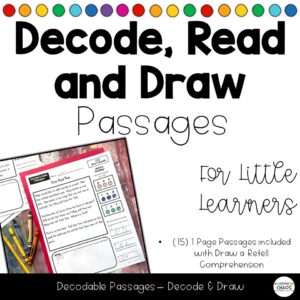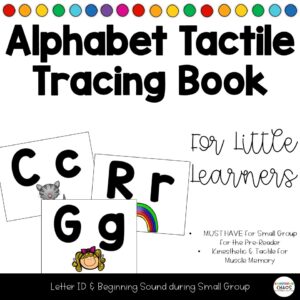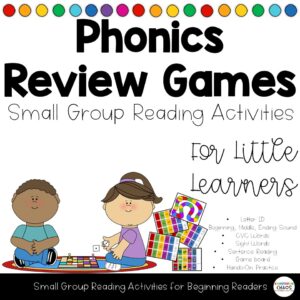The Science of Reading is a decades-old method that argues for explicit instruction in reading. Unlike speech, reading is not an instinctive process. Therefore, reading instruction must be explicit, systematic, cumulative, and diagnostic. This academic approach is backed by numerous years of scientific research and real-time classroom experience.

Reading is a fundamental skill that provides lifelong opportunities for learning. It is considered the most crucial ability a child can acquire, which is why teachers and schools worldwide are constantly researching and improving methods to teach it effectively.
With knowledge of the Science of Reading (SOR) and the implementation of effective strategies, teachers can set little learners on a path towards becoming successful readers and learners from an early age.
Science of Reading (SOR)
As an early childhood teacher, understanding the Science of Reading (SOR) in kindergarten is crucial in promoting early literacy skills in little learners. Here are some important contextual points to consider:
- The science of reading focuses on the cognitive processes involved in learning to read, including phonemic awareness, phonics, fluency, vocabulary, and comprehension.
- Kindergarten is a critical time for developing these early literacy skills, as children are just beginning to learn letters, sounds, and the basics of reading.
- Research has shown that explicit and systematic instruction in phonics, combined with opportunities for children to practice reading and writing, is most effective in promoting early literacy.
- It’s important to provide a print-rich environment in the classroom or at home, with plenty of books, labels, and other materials to expose children to written language.
- Additionally, incorporating activities that promote oral language development, such as read-alouds and discussions, can also support early literacy skills.
Phenomic Awareness
Phonemic awareness is a critical component of early literacy development. Here are some additional facts to consider:
- Phonemic awareness includes the ability to identify and manipulate individual sounds (phonemes) in spoken words. The ability to recognize that individual letter sounds and blends combine to form words. When you say the word “cat,” you don’t pronounce it as “cuh-a-tuh.” However, when attempting to spell or pronounce a word, you slow down and enunciate each letter or blend. This is the basis of phonemic awareness and an essential skill for language development.
- Children who have strong phonemic awareness skills are more likely to become successful readers.
- Phonemic awareness activities can be fun and engaging for little learners, and can include things like rhyming games, sound blending, and sound segmentation.
- Phonemic awareness is just one of several foundational skills that children need to develop in order to become proficient readers. Other skills include phonics, fluency, vocabulary, and comprehension.
- Teachers can help promote phonemic awareness by incorporating phonemic awareness activities into their daily routines, such as singing songs, reading books with rhyming text, and playing word games.
Phonics
Phonics is an instructional method that guides little learners to recognize the relationship between letters and the sounds they represent. By sounding out individual letters or practicing letter blends, such as “ch” or “st,” little learners can easily grasp the connection between letters and sounds, as well as spelling patterns.
- Phonics helps children decode unfamiliar words, making reading less frustrating and more enjoyable.
- Phonics also improves spelling skills by teaching little learners the rules behind spelling patterns.
- Research shows that phonics instruction can lead to improved reading comprehension, particularly for struggling readers.
- By mastering phonics skills, little learners gain confidence in their reading ability, which can have a positive impact on their overall academic performance.
“Teaching Systematic & Explicit Phonics – Summer Book Study 2022 – Chapter 5” has more information on instruction.
Fluency
Fluency is a crucial aspect of reading that involves the ability to read words accurately, quickly and with expression. It is the culmination of all the reading skills working in unison. Fluent readers can easily sound out words, focus on comprehension and convey meaning through reading with expression. Here are some tips to help develop fluency in kindergarten students:
- Encourage regular reading: Consistent reading practice builds fluency. Try to set aside a specific time each day for reading.
- Prioritize accuracy: While speed is important, accuracy is key. Encourage little learners to take their time and read with attention to detail.
- Work on expression: Reading with expression is just as important as speed and accuracy. Practice varying tone, pitch and pace to match the meaning of the text.
- Use guided reading: Guided reading is an effective strategy where a teacher works with a small group of students to practice reading skills.
Remember that developing fluency is a process that requires patience and practice. Ensure that your little learners have ample opportunities during the school day to engage in meaningful reading practice.
Go to post “What Is Reading Fluency?” for for information and activities.
Vocabulary
As children learn to read, it’s important to understand the science behind vocabulary development. While phonics and phonemic awareness help children learn to say or spell words, vocabulary is about understanding what words mean. A strong vocabulary is essential for reading comprehension and fluidity. Here are some key points to keep in mind:
- Vocabulary can be divided into two categories: receptive and expressive. Receptive vocabulary is what we understand when we hear or read words, while expressive vocabulary is what we use when we speak or write.
- Vocabulary begins to develop from a young age and advances as we age. Little learners acquire new terms from parents, teachers and peers. Reading books with a wider range of vocabulary is crucial to improving language skills.
- A rich vocabulary can enhance critical thinking skills and boost confidence in self-expression. It can also improve comprehension of complex texts and increase knowledge.
Expanding a child’s vocabulary is crucial during their kindergarten years as it sets the foundation for their future language development. Here are some tips to help increase vocabulary in kindergarten:
- Read alouds with a variety of books need to be a frequent occurrence in your classroom.
- Encourage questions and discuss what they have read or learned.
- Play word games like “I Spy” or “Rhyming Words” to make learning new words fun.
- Use descriptive words when talking about everyday objects and experiences.
- Introduce new vocabulary words throughout the day.
Remember, building a strong vocabulary is a gradual process and requires patience and consistency. With these tips and a little dedication, your little learners will be well on their way to becoming a confident and articulate communicator.
Comprehension
As children enter kindergarten, the focus on comprehension becomes even more important. At this stage, they are expected to not only understand individual words and sentences, but also to form connections between them to comprehend the overall meaning of the text. Here are some reasons why comprehension is especially crucial in the early stages of reading development:
- Comprehension lays the foundation for lifelong learning: If little learners are unable to understand what they are reading, they will struggle to learn new information throughout their academic and personal lives.
- Comprehension is essential for critical thinking: As children develop their comprehension skills, they are able to think more critically about what they are reading. This is an important skill for problem-solving and decision-making.
- Comprehension promotes language development: By understanding the meaning behind words and sentences, students are better equipped to expand their vocabulary and develop their language skills.
Therefore, it is important to prioritize comprehension skills in the early stages of reading development. By reading aloud to little learners, asking them questions about the text, and encouraging them to make connections between their own experiences and the text, we can help them develop strong comprehension skills that will serve them well throughout their lives.
Posts “Strategies That Work – Summer Book Study For Reading Comprehension – Chapters 1 & 2” and “Comprehension is the Key to Reading” have more on this subject.
Explicit Instruction
As you dive deeper into the Science of Reading (SOR) for kindergarteners, it’s important to keep in mind that explicit instruction can make all the difference in helping little learners develop strong foundational reading skills. Here are some examples of explicit instruction strategies that may be particularly effective for kindergarteners:
- Phonemic awareness: This involves teaching little learners to recognize and manipulate individual sounds in words. Activities such as rhyming games, clapping out syllables, and segmenting words into their individual sounds can help build phonemic awareness.
- Letter-sound correspondence: Once students have a good grasp of phonemic awareness, they can begin to focus on the relationship between letters and sounds. Explicit instruction in letter-sound correspondence can include activities such as letter-sound matching, blending sounds to form words, and decoding simple words.
- Sight word recognition: Sight words are high-frequency words that little learners should be able to recognize on sight without needing to sound them out. Explicit instruction in sight word recognition can include activities such as flashcards, word walls, and games that encourage repetition and practice.
By incorporating these explicit instruction strategies into your Science of Reading (SOR) curriculum for kindergarteners, you can help ensure that all students are equipped with the foundational reading skills they need to succeed.
Go to my Kindergarten Chaos Store for many fun, engaging and purposeful activities to aid in your Science of Reading instruction.




